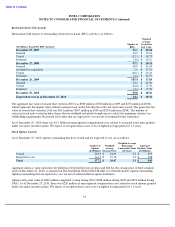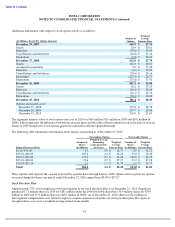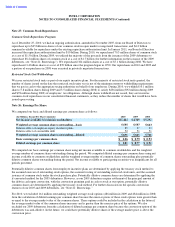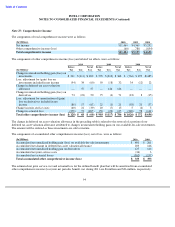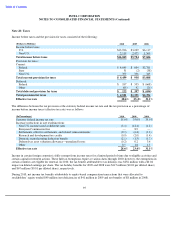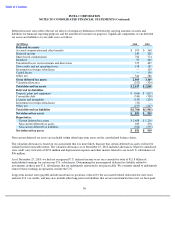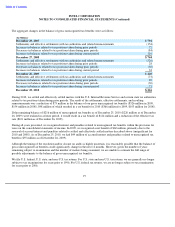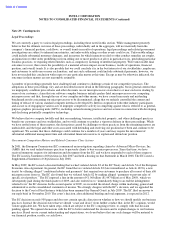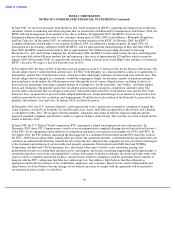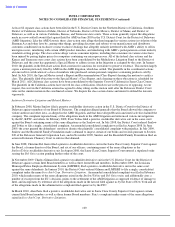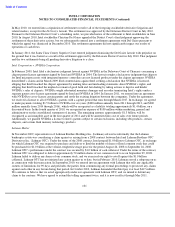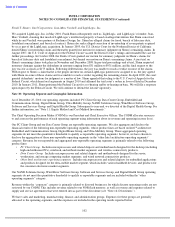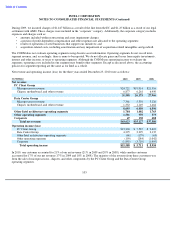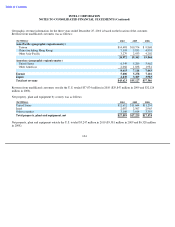Intel 2010 Annual Report Download - page 132
Download and view the complete annual report
Please find page 132 of the 2010 Intel annual report below. You can navigate through the pages in the report by either clicking on the pages listed below, or by using the keyword search tool below to find specific information within the annual report.
Table of Contents
INTEL CORPORATION
NOTES TO CONSOLIDATED FINANCIAL STATEMENTS (Continued)
In June 2005, we received an inquiry from the Korea Fair Trade Commission (KFTC) requesting documents from our Korean
subsidiary related to marketing and rebate programs that we entered into with Korean PC manufacturers. In February 2006, the
KFTC initiated an inspection of documents at our offices in Korea. In September 2007, the KFTC served on us an
Examination Report alleging that sales to two customers during parts of 2002–2005 violated Korea’s Monopoly Regulation
and Fair Trade Act. In December 2007, we submitted our written response to the KFTC. In February 2008, the KFTC’s
examiner submitted a written reply to our response. In March 2008, we submitted a further response. In April 2008, we
participated in a pre-hearing conference before the KFTC, and we participated in formal hearings in May and June 2008. In
June 2008, the KFTC announced its intent to fine us approximately $25 million for providing discounts to Samsung
Electronics Co., Ltd. and TriGem Computer Inc. In November 2008, the KFTC issued a final written decision concluding that
our discounts had violated Korean antitrust law and imposing a fine on us of approximately $20 million, which we paid in
January 2009. In December 2008, we appealed this decision by filing a lawsuit in the Seoul High Court seeking to overturn the
KFTC’s decision. We expect a decision from the court in 2011.
In November 2009, the State of New York filed a lawsuit against us in the U.S. District Court for the District of Delaware. The
lawsuit alleges that we violated federal antitrust laws; the New York Donnelly Act, which prohibits contracts or agreements to
monopolize; and the New York Executive Law, which proscribes underlying violations of federal and state antitrust laws. The
lawsuit alleges that we engaged in a systematic worldwide campaign of illegal, exclusionary conduct to maintain monopoly
power and prices in the market for x86 microprocessors through the use of various alleged actions, including exclusive or
near-exclusive agreements from large computer makers in exchange for “loyalty payments” and “bribes,” and other alleged
threats and retaliation. The plaintiff claims that our alleged actions harmed consumers, competition, and innovation. The
lawsuit seeks a declaration that our alleged actions have violated the federal and New York antitrust laws and the New York
Executive Law; an injunction to prevent further alleged unlawful acts; unspecified damages in an amount to be proven at trial,
trebled as provided for by law, restitution, and disgorgement; $1 million for each violation of the Donnelly Act proven by the
plaintiff, and attorneys’ fees and costs. In January 2010, we filed our answer.
In December 2010, the N.Y. Attorney General’s staff requested the court’s permission to amend its complaint to expand the
scope of parties covered by its Donnelly Act and Executive Law claims. Intel filed an opposition to the motion, and a hearing
is scheduled for May 2011. We disagree with the plaintiffs’ allegations and claims in both the original complaint and the
proposed amended complaint, and intend to conduct a vigorous defense of the lawsuit. The court has set a trial to begin on this
matter in February 2012.
In June 2008, the U.S. Federal Trade Commission (FTC) announced a formal investigation into our sales practices. In
December 2009, three FTC Commissioners voted to issue an administrative complaint alleging that we had violated Section 5
of the FTC Act by engaging in unfair methods of competition and unfair acts or practices in markets for CPUs and GPUs. In
November 2010, the FTC publicly announced the final approval to a settlement between Intel and the FTC that fully resolves
the FTC’
s 2009 lawsuit against Intel. Among other provisions, the agreement includes: a statement that the agreement does not
constitute an admission that Intel has violated the law or that the facts alleged in the complaint are true; provisions with respect
to the treatment and extension of certain intellectual property agreements between Intel and AMD, Intel and NVIDIA
Corporation, and Intel and VIA Technologies, Inc.; provisions with respect to Intel’s sales, marketing, pricing, and
promotional activities for certain Intel microprocessors and chipsets; provisions concerning engineering and design changes to
certain Intel products; provisions concerning Intel’s actions with respect to product roadmaps; disclosure and other terms with
respect to Intel’s compilers and related products; and provisions related to compliance with the agreement. Intel continues to
disagree with the FTC’s allegations that Intel has violated any law. Nevertheless, Intel believes that the settlement is
appropriate and in the best interests of its stockholders, employees, and customers. Based on our current understanding and
expectations, we do not believe that any changes in our business practices to comply with the agreement will be material to
our financial position, results, or cash flows.
99


